by David Oates
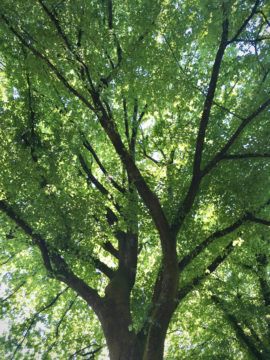
In the plague year I walked every day, just about. It added up to a long journey of surprising homeliness. A solidarity of strangers. A neighborhood of distance and vista. A journey far and yet without the lie of the exotic.
It began in March over a year ago now. Since I was about to turn seventy, I had been planning a Big Do: hired a violinist from our Portland orchestra, plus a pianist who was a splendid performer (and also my teacher on alternate weeks). They would play for my birthday guests: I hoped for part of Beethoven’s Spring Sonata, and something from Mozart; and to celebrate my wonderful piano, a couple of Goldberg Variations and some Chopin. Who wouldn’t love such an evening?! I sent out invitations weeks ahead. The musicians rehearsed at my home.
But with one week to go, the picture clouded. Do you remember how our collective predicament came on? Each day, we wondered – how bad is this, really? On Monday I sent a placating email to my guests: “We’ll all be masked, but follow your conscience. . .” On Wednesday another: “If you can’t make it, I’ll understand. . .” The situation ripened sourly, direly. Almost hour by hour came new reports: infection, contagion, danger. With one day to go, I cancelled it.
And went for a walk.
* * *
I walked all the way to Palm Springs. From Oregon – from my brick front step with the green awning – a thousand miles. It took the whole year.
Or I walked to Denver but caught a Lyft for the last 120 miles (I am a careful accountant, no lies or traveler’s exaggeration from me!) Or I hiked straight up through the atmosphere, passed through the troposphere, left the Earth dizzying behind me, and – memorable moment! – got well past the Kármán Line, the boundary where the last thin bits of air meet mere outer space. It was less picturesque than you might think.
During our year of solitude and quarantine, I walked about three miles a day and it added up. Through the unsettled weathers and seasons. Good news, bad news. Mask around my neck – to be pulled up whenever proximity threatened. Meeting other walkers. . . surprising numbers of them, joggers, parents with babies in strollers. Or jogging mammas pushing athletic prams and attracting my admiration. Solitaires. Couples old and young. Knots of chattering, swearing middle-schoolers. Everyone.
Tree-lined urban neighborhoods stretch for miles around my house in three directions – the fourth (west) being a thirty-five minute walk over a bridge into downtown. Day by day I step out into the risky-feeling world. How contagious is this thing, anyway? How scared, or careful, should I be? It is a vivid question. We just don’t know.
But as the walking develops, a sweet solidarity emerges: a practice, a courtesy, an etiquette. If I turn a corner and see someone headed my way on the sidewalk, I make a little detour into the street, leaving a parked-car distance between us. Or someone else does this for me. And maybe a little wave comes from one hand. Or a head-nod, with the eyes brightened above the mask, the eyebrows up, to signify kindliness, a thank-you.
When have I ever felt so much forbearance, such care, from my fellow citizens? Maybe getting us out of our cars has helped, stripping off the defensive ton of sheet metal and plastic, the private entitlement of horsepower. Instead we feel something mutual, a quietness shared, briefly, a mutuality of purpose. From across the little tree-shaded roadway, a wave feels like a way of touching.
March ends and spring comes on and there is more and more foot traffic. Masked of course. Soon we are well practiced at the gentle weave, the space-making, the wariness, the wave. It is stately, almost, with a powdered-wig kind of formality to it that would have served at court, to music of Byrd or Rameau. We might have bowed to each other at the end of the block – why not!
Neighborhood streets show less and less traffic as the weeks turn by – and soon they are nearly deserted of cars, walkers striding right down the middle sometimes. Ordinary birds stand in the middle of the quiet street, crows or robins eying the big bipeds walking by, then ignoring them.
* * *
Spring weather in Portland can be almost anything – a sunny afternoon, dogwoods and plum trees in full ecstatic pink and white – then a little sprinkle from piled-up fluffclouds – more sun – then thunderheads bright-topped but slate-black on their flat bottoms scudding around until striking, here and there, with a full downpour featuring a one-minute excitement of hail that rattles and bounces from sidewalks and the hoods of parked cars and collects in the gutters. Soon I’m watching the pink and white petals pummeled onto the sidewalk and street, drifts and pileups of petals and hailstones like a parable in action, a koan of hopeless, gorgeous brevity. Soon blinding sun sparkles from it all, and I walk forth on a carpet of flowers as if all nature were celebrating my triumph.
Me, the wanderer, the stranger nodding to those who clear a way for him, or who clears a way for them.
* * *
Summer comes on with a languid slowness. The travels my partner and I would normally be preparing are all off, of course. Jollities with friends, off. Catching up with family, visiting aged parents, off, off, off.
My days are long and unbroken except for walking. Yet I have to report: I’m a writer, and this quietude is no hardship. In the cool of northwest summer mornings I read poetry – journals that arrive monthly, Rattle, Spoon River, Poetry Northwest. Or I explore slender volumes of verse (as the saying used to be) – new talents encountered, words joined strangely, phrases struck hot upon the anvil.
Day by day I’m writing deeper, trying to strip off the husk of habit and convention – including poetic convention – to arrive at some kind of cracked-open truth, some words which have never, in all time, been hitched together just so.
* * *
As this quiet private life unfolds, our summer of principled riots and presidential rackets immiserates the public realm. Black Lives Matter stirs up our downtown, pounding two big grassy squares into dirt, spray painting tags onto every possible surface. I’ve walked around in it – but only in the silent seethe of daytime. Like other Portlanders, I marvel at how the righteousness of this cause gets hijacked by idiotic anarchists and destructive angry taggers and breakers. We hope for black voices to reassert, but they don’t. At least, from this distance they don’t appear to. At night I’ve stayed away, with bad conscience. Nothing I can do to pretend that I’d risk my physical wellbeing in this (or almost any) cause. I watch the footage of armored young soldiers shoving, beating, taking their cheap shots and their expensive ones too, I guess. I’ve been nursing my bad knees ever since they canceled my senior year of running. Gave up various avocational sports too, but managed to keep mobile, even to be a pretty good hiker – which has been a prime directive in my life. Most of my good writing has come from some perambulatory situation or other. I limp sometimes, but I get the mileage. It cures me of my bookishness, opens up the whole world.
But going headfirst into head-cracking and bone-breaking? Can’t do it.
As to the presidential racket – we’ve had four years of accepting that it cannot be ignored. The strutting and posturing, the bald comb-over lies – infuriating, galling, really beyond fiction. Reminds me of cakewalking revivalists in their tents full of willing gulls. And now Americans are dying by the hundreds of thousands, Covid deaths surely multiplied by malfeasance in the highest offices of the land.
That’s what our summer was. What we walked through.
* * *
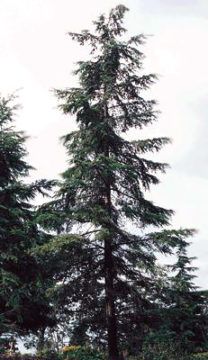
And then one day, crossing a bridge, I felt it. Really felt it. All my defenses and hearty psychic boundaries seemed to vanish. It was like a small twig breaking. Or something falling in the forest, crashing down. Sorrow, I thought: So this is sorrow.
It may have been the extremity of our summer drought that broke me, the burning up of our world. Or the spectacle of hapless suffering, tubes in throats, lonely deaths. I couldn’t follow it deeper, I had no analysis. Just: a sense of great, collective sorrow. Suffering and destruction. Moneymaking and grandstanding and no hand on the tiller.
I was in a green place, surrounded by evergreens, firs and hemlocks beloved to me. Immemorial. But they had no word of peace. We had chosen these evils together, we Americans. We humans. We had begun wronging ourselves and could not stop.
All the swaying beauty of our green northwest had no answer. The rivers that seemed to promise everything. The nodding prayer-tops of the hemlocks, the morning and the evening: nothing. We were broken, snapped, our emptiness revealed.
What was there to do then but keep silence. And walk.
* * *
Two miles out in my extended neighborhood there’s a coastal redwood tall on a corner. It must have been planted around the time of the Civil War. I can mark my way by it from a quarter-mile off.
Close by my home are American elms arching high over a very nice older neighborhood. I walk there in some special green world, shaded, sheltered. How they survived the continent-wide die-off, I know not. Now, as the year begins its turn toward fall, some of them get inoculated, I see the truck and the worker. It’s just September and still summery and warm. But the angle of light tells me something different. Already the sun is striking in aslant. And noon is a laugh, what is this northern zenith but a light peering over your shoulder, warm but low, as if about to leave. Which it is.
I know where to find an atlas cedar, branching in its upward way as if raising arms in joy. So tall, so immense. So comforting.
Old maples with storybook holes in their trunks, grimacing hollows to peer into and surmise tales. Alice. Tinderbox. Bunnyrabbits on errands. A tree’s interiority, dark with maybes.
By the nun’s big retirement house, a tartan elm bigger than big, but with delicate leaves imprinted with paleness, twinkling. It’s like a big round chubby man who somehow dances lightly, beautifully. Ollie sometimes, Jackie sometimes. You remember them. In some world where gravity weighs less than joy.
Saplings and fresh plantings next to old old survivors. Burls, knots, barks of various roughnesses and compositions.
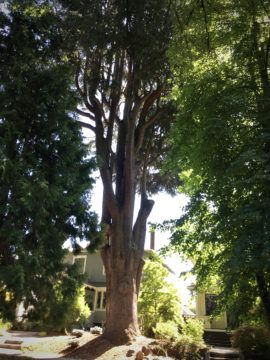
Each one moving or standing in that arboreal whirl of stillness: To persist. To green up. To give over. And then to persist again.
* * *
In mid-September I realize we have marked one half-year of quarantine. We are old hands now, practiced at withdrawal and distant friendliness. My twenty-mile weeks are adding up, I log every mile and every tenth. It’s easy work, this; a walk is answer to all despondency, all megrims and dudgeons. A briskness of accomplishment. A kind of thinking, actually – embodied, free, bipedal. I like myself in this guise.
But on an early Friday morning I walk into what seems the landscape of some other planet, one with orange air and a smell of cold burning. Oregon forests to our south are transforming themselves into ash and lung disease. The hotness and dryness of this summer are going up in smoke that carries to cities two hundred miles to the north, three hundred, in our case to get caught in a stagnant depression of cool Pacific air. It’s what I breathe.
The light is wrong, as if early and late at the same time. It’s nine a.m. and a streetlight burns a dirty hole in the mist.
But I feel like a walk so I’m walking. Stay indoors if vulnerable, says the radio. Am I? I feel normal, and what’s a little atmospheric orangeness to a boy who grew up in the Los Angeles of the ’50s and ‘60s? We watched the air turn daily from gray to umber to some kind of fiery summer tangerine, and our cross-country coaches sent us into afternoon workouts in it. We said Yes Coach and off we went.
In the evenings, however, it would hurt to breathe deeply. We knew how to take shallow breaths, those wouldn’t hurt.
But I feel like a walk so I’m walking.
Somewhere in DC there is a president with Covid. If he recovers they’ll say it’s God’s deliverance. And if he dies, the rest of us will say the same.
How many dead Covid-deniers would it take to establish how ironic this world really is? How eagerly I read their stories – the singing street evangelist from Virginia who laughed at this “hoax emergency,” traveling to mix with crowds and presidential rallies – dead now. The cocky Baptist pastor, calling in the flock for Sunday services despite the ban – dead now. All the contagion caught and spread by plague deniers. The march of folly in our public squares and politics: White House aides, supporters and donors, opportunists and true believers. Plague deniers like a children’s crusade – each of them practicing a certain kind of vision, a squint that only sees what it wants to see.
What not to see is what defines a life.
So, what if he dies? Is it wrong to think what everyone is thinking anyway? I wish for better thoughts. They don’t come.
But I feel like a walk so I’m walking.
* * *
One week to go for the election.
These are the days we won’t remember. We’re living them now, masked, avoiding the news which only repeats what we’ve worried and fretted about for so many months. We feel exhausted, crazy, unbalanced. So we ignore it, waiting for the event. Finally.
But worrying through all the scenarios anyway. Yet I know that once the dreaded event happens, no one will remember the days just before.
History is like a counter-top full of ants. Just milling around at high speed and twiddling their antlers as they go. They don’t know where they are, really. And neither do we.
When it happens – another four years of catastrophe, or some kind of vindication – then we’ll know where we are. It will make some kind of sense.
Right now? Who knows. Walking doesn’t help. But it doesn’t not help, either. So here I go, anting along.
* * *
When I see those American elms going bare, it’s a sign that our long season of cold and wet is finally arriving. Somehow I rejoice at this. The clocks change and it’s really dark-dark now. Short days, wet skies. Out on the mountain slopes, our Pacific Northwest forest is constructed out of summer drought and then these seven or eight months of relentless drip. Evidently this is what lets the conifers out-compete the broad-leafed trees – photosynthesizing all winter long, then conserving moisture during the droughty summer interval. So I never complain at the long gloomy damp. I think of the forests, so dense with mosses deep and thick, with decaying logs and downscatter, lichens and undergrowth and overgrowth too. The long wet season is the price of all this life, and I’m glad to pay it.
Here in the neighborhood, the leafy canopy of elms transforms now into bare-limbed choirs arched overhead, and this too is a kind of thinking. A thoughtspace. Every season its own thought.
A small black dog leans at a forty-five degree angle away from its human, straining at the leash and resisting literally every step. Every single step. A fierce little will, wholly unable to learn or change. Down the block they go before me, an upright woman and a small exclamation point thrusting ever sideways.
My perpetual straining seems to have been suddenly relieved. The removal of this pestilential president – it comes like sudden good news, though all the signs pointed this way. Still – suddenly we breathe.
And news of vaccines enters the picture. We can begin to imagine living in a normal country, one that follows evidence and good sense and science, that chooses leaders of good will and no obvious signs of depravity. Yes, this is what the end of November means, this time.
* * *
In the rainy days after New Years, I continue my daily practice. Of course – when do I ever give up on anything? What I lack in talent I imagine supplying in sheer stubbornness. My piano playing goes this way too. I think that if I just show up and put in the practice time, something good will happen. Or something better, anyway.
And actually it does. I pass the one-year mark with my piano teacher with something to show for it. A couple of Goldberg Variations, as I wrote about a year ago. Claire de Lune sounding rich and delicious. A pair of Haydn sonatas bright bright bright. They make me happy, each one of them. Like I had been transformed into a musician for at least a few bars, a few minutes. Yes – a kind of happiness. In the moment.
Walking does that too. Not so much the destination, just the dailyness of it. Like breathing: an end in itself. This is good for me. Winter is no obstacle in this mild northwest – rainproof jacket, good shoes. The big umbrella for truly rainy days. Or the collapsible one stuck into the back pocket in case our perennial gray-drizzle-with-pauses-and-maybe-even-sunbreaks goes the other way towards showers. Being ready is all it takes. A wet walk is as good as a dry one. It can go inward. But it reminds me to stay outward. With everyone else, all in this together.
On a fair day, or fairly fair anyway, a drunk or crazy curses me from across the street as I make a one-block dogleg stepping up toward twentieth street. He’s sitting on someone’s front step in a row of condos; it’s midday and I suppose no one is home to chase him off. Anyway, his catcall is brutal and vivid and I make a point of not reacting, just taking the next left to carry me away from his weirdly skillful words, which mock at once my physique, my stride, and my manliness. This is one florid damaged dude!
And I begin to wonder if somehow it could take, this curse. Leave some kind of invisible mark. If this were Italy I’d know how to spit twice and cancel it out. As it is I find a surprising reservoir of anger responding to this surprise attack. Fantasies of administering a beating, say. Though I’m not competent in this way, not at all, and I haven’t been in a scuffle since my last year of high school (when someone knocked me down on the infield of the track, for reasons which I never was privy to). (Okay, it was a young man called Darrell Flud, believe it or not. I was a way better runner; maybe that’s the explanation. Darrell, if you are reading this by some additional kink amidst all the flukes of this universe: I do not forget. And I do not forgive.)
But as my blood cools and I laugh at the idea of a fight, or a curse, I wonder further. If someone were to bless you, let’s say in Italian, or in some gypsy tongue you didn’t know – would that work? Assuming the blesser really meant it, all the mystery and power of it. If there is any. Or would you just stare at the strange babbler and quickly turn the next corner, trying not to notice?
Would such a blessing take? Normally I have no truck with woo-woo, no need for angels and demons and mystic powers. But on this gray day, I wonder. What do we know about being, anyway? We are afloat upon mystery – baffled always and in every second by the strangeness of even existing. Maybe gypsy diphthongs and strange offputting looks – the wild glossy la-la, the odd curse – are as expressive of this fundamental unknowability as anything else.
* * *
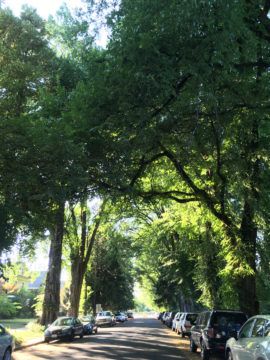
Soon I have eased into the lovely neighborhood called Ladd’s Addition, that nearby elm-forest that’s grown up around huge late-nineteenth-century houses with wooden corbels and gables, wrap-around verandahs and attic-story dormers for maiden aunts (or maiden uncles) and leftover grandparents. And as I navigate its quirky roundabouts and little diamond-shaped rose-gardens circled by one-way streets, I recall a blessing that came to me last summer.
A young man on a bicycle had come wheeling by, and I suppose I must have ogled him a little too openly, for he was young and well-knit and he went by like a memory of something I used to think I could have, or be. And a day or two later, as I followed the same route, he came by again too, in the warm gloaming of a summer’s eve, and this time he circled back around, never slowing or even looking, shouted “I love you,” and rode on down the block around the corner and away.
Was this mockery? It could have been. But if you ask me it was blessing. A kindness offered for no reason at all.
It’s hard to remember how evil people are, when you’re in daily enjoyment of so much of their goodness. Whichever way you feel about this, you’re probably at least half wrong.
* * *
Exactly one year and one day from my canceled birthday concert, I receive the first Covid inoculation. My partner does so at the same time. I experience no side effects; he feels achy and low for a few days.
But both of us notice a distinct lifting of spirits. A sense that, after all, this too shall pass is the right cliché for the moment. At last an end is imaginable, if not yet fully in sight.
In a celebratory mood I add up my mileage. The three pages of xeroxed grid scotch-taped onto my closet door record each day of every week since last March, the miles and the tenths of miles. Sometimes a note about health or glitches and interruptions. Or best of all, notes about days when the walking was hiking, off in the woods, or down on our not-too-far-away coast. So a beach walk, our slow steady stroll while winter combers crash and the ocean and the clouds and the sky and the sun bring their everchanging conspiracy of elation, promise, and mystery. All the things about being alive that can’t be said.
Or the woods, ditto but in what a different key. That fretwork of moss and needle, of living large – those big trees, old hemlocks and cedars standing by rivers, same as they ever were. Another way to say, seemingly eternally, what cannot be actually said.
Our hearts are lifted. And soon after these getaway hikes I’m back home, heading out the door for my city walk, laughing at the domesticity of it, the lawns and flowers. Kitties in the yard. All the ticky-tacky houses. Or, to be fair, nice ones.
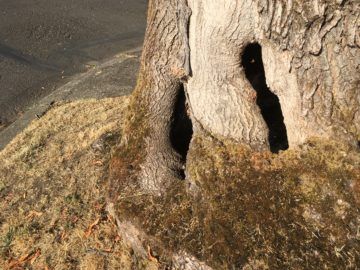
I walked 1043 miles in 365 days. Had I headed north, I could have gone all the way to Prince George, British Columbia – passing through Spokane and Banff National Park and two other wilderness parks to boot. Now as I gaze at the map I sorta wish I had done so, a big heroic one-way trip instead of these homely little loops I’ve been crocheting into my days. I would be more like one of those righteous travelers, Peace Pilgrim or whoever, with their virtuous innocence and high intent. My adventure has been so domestic – dinner with the sweetheart every night, and home in my own bed.
Yet the year – what a year. We didn’t die, he and I. We stayed safe. He made art, I wrote. We hung on tight and cheered for civil rights protesters, though not for their parasites and hangers-on who so often co-opted the movement. And we cheered for a new presidency, that began to cleanse our national politics of the deadly pretending and embittered racism that had infected it. Our nation did not succumb, either.
We are surviving together into whatever comes next, growing into it, if we can. Each day a new journey. Destination: who knows. Home, perhaps.
